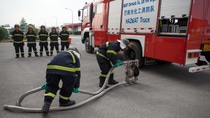Promoting Responsible Care in China
The deadly explosion at Tianjin port in 2015 did a great deal to raise public awareness in fire prevention and safety management in China.
Yet, 30 years ago, the international chemical industry was already thinking about the impact of industrial chemical accidents on the environment. In 1985, the Canadian government initiated the idea of Responsible Care. In 1992, the International Council of Chemical Associations (ICCA) gradually started promoting this concept worldwide; multinational chemical companies, one after another, began incorporating Responsible Care into their business-development goals and business policies.
Responsible Care is a program voluntarily initiated by the global chemical industry where participating companies are committed to improving their performance in protecting environment, health and safety (EHS), as well as disclosing information about their products and processes to stakeholders, thus building a new image of the chemical industry in the society, and driving the sustainable development of the global chemical industry.
As a practitioner and advocator of Responsible Care, BASF leads by example in China, practicing the principles in the company’s daily operations. Moreover, BASF assists relevant government agencies and communities in building a strong emergency response team to further promote the implementation of Responsible Care in the China chemical industry.

“More and more companies in China’s chemical industry have realized the contributions made by Responsible Care, and have committed to the system. We feel very much encouraged.”
Charlie Zhang, Head of Responsible Care, Greater China, BASF
As a co-initiator of the Responsible Care Global Charter, BASF was among the first multinational companies to share the concept with the Chinese government and the nation’s companies.
In 2008, Zhang Dejiang, who was the Chinese Vice Premier at that time, visited BASF in Ludwigshafen during his visit to Germany. Dr. Jürgen Hambrecht, who was Chairman of the Board of Executive Directors, BASF SE, introduced in detail what the company had achieved in regard to Responsible Care.
In the 1960s and 1970s, Germany’s Rhine River was polluted by industrial waste water. Mannheim and the Ruhr Industrial Site were shrouded in fog and haze, and incidents occurred frequently at chemical plants.
With the adoption of the concept of Responsible Care by BASF and other German chemical companies as one of their key development strategies, the polluted water began to become clear, and the once-hazy sky turned blue gradually. The casualty rate in incidents at BASF plants decreased, from an average of more than 20 fatalities annually in the 1970s to zero after 2000 due to the process safety.
Vice Premier Zhang showed strong interest in Responsible Care after listening to the BASF presentation. Upon returning to China, he started, and eventually facilitated, the China Petroleum and Chemical Industry Association (CPCIF) to launch and promote Responsible Care in the country’s chemical industry.
As a key member of the CPCIF, ICCA and the Association of International Chemical Manufacturers (AICM), BASF actively promotes Responsible Care in China. It plays an important role in the areas of emergency response, dissemination of chemical-related laws and regulations, and public communication. BASF’s outstanding performances have been recognized by the relevant authorities throughout the country.
In 2014, BASF was granted the “Responsible Care Organization Award” by CPCIF. The following year, BASF received the “Responsible Care Chairman Award” by AICM. In Taiwan, a BASF site received an award from the local municipal government for its great contribution to Responsible Care, while a site in Shanghai was named the “Advanced Enterprise for Energy Saving and Emission Reduction”. That same year, the BASF site in Nanjing was nominated by Nanjing Chemical Industrial Park as one of the most advanced units in the area of safety.
In September 2015, Dr. Kurt Bock, Chairman of the Board of Executive Directors, BASF SE, presided over the Responsible Care Global Charter Signing Ceremony in Shanghai. Documents signed by more than 400 Chinese chemical enterprises were delivered from CPCIF to ICCA, underlining the collective commitment of Chinese chemical companies to Responsible Care.
“Responsible Care has helped to establish the standards in the global chemical industry,” said Charlie Zhang, Head of Responsible Care, Greater China, BASF. “Through years of efforts made by BASF, more and more companies in China’s chemical industry have realized the contributions made by Responsible Care, and have committed to the system. We feel very much encouraged.”

“We hope to lead the implementation of high EHS standards in China’s chemical industry, improve transparency and communication with our neighbors, improve emergency response capabilities, and benefit the industrial parks where we operate and the residents of the neighboring communities.”
He Xinyuan, Chief Representative, Shanghai, BASF (China) Co., Ltd.
Increasing community awareness is important for practicing Responsible Care in the chemical industry. BASF actively communicates with the community where it operates, maintains information transparency, conducts open dialogues, supports the construction of communities, and assumes social responsibilities.
BASF has 84 Community Advisory Panels (CAPs) globally, primarily at larger production sites. Consisting of individuals who live near a chemical facility and who represent the fabric of the community, a CAP is a forum for open and transparent dialogue between citizens and plant management. In Greater China, BASF supports CAPs in Shanghai, Chongqing, Nanjing and Taiwan.
Through CAP, BASF regularly conducts open dialogues and Site Open Days. In addition to project briefings and operations introductions, BASF also organizes discussions on topics relating to the interest of local communities, such as environment, safety and employment, maintaining relationships with local communities and enhancing mutual trust.
BASF has a stringent EHS self-supervision and appraisal system and a sound emergency response system. It regularly conducts internal training on dangerous goods emergency response. Moreover, it has established a long-term and extensive exchange mechanism with the external environmental protection authorities, fire prevention authorities and chemical industrial parks, sharing its EHS management and practice experience with peers and neighboring chemical companies. In 2015, for example, BASF shared best practices in Responsible Care with EHS management from multiple Chinese chemical companies in the Shanghai Jinshan Second Industrial Zone.
“BASF actively fulfills corporate social responsibility and support government authorities in the areas of safety and environmental protection,” said He Xinyuan, Chief Representative, Shanghai, BASF (China) Co., Ltd. “We hope to lead the implementation of high EHS standards in China’s chemical industry, improve transparency and communication with our neighbors, improve emergency response capabilities, and benefit the industrial parks where we operate and the residents of the neighboring communities.”
According to Zhang, in order to exchange BASF Emergency Response know-how, as well as to foster further cooperation within the Transportation Accident Information and Emergency Response System – a network formed by government entities and companies in Germany – BASF invited delegates from the Shanghai Administration of Work Safety to visit BASF Ludwigshafen in 2015. There, they shared the rich experience of BASF’s fire-control team with more than 100 years’ history and exploring the emergency response mechanism for chemicals.
When they returned to Shanghai, the delegation immediately began working on the implementation of the emergency response mechanism, and asked BASF to provide relevant support to improve the knowledge of dangerous chemicals and emergency-response capabilities of relevant personnel.
With the support of the Shanghai Fire Department, BASF cooperated with Shanghai Chemical Industry Park Administrative Committee and its fire brigade to establish its own professional fire prevention team within the plant, experimenting with new measures and approaches, and establishing best practices in emergency response.
In September 2015, a national-level comprehensive drill on special equipment safety was conducted at BASF’s Caojing site. It was the first time that the Shanghai municipal government had held such a synergistic drill between government and companies in a chemical production facility. More than 100 participants, from the Shanghai Chemical Industry Park (SCIP) Emergency Response Center, Medical Rescue Center and BASF, attended.
In 2015, BASF donated a specially designed environmental protection vehicle equipped with specific instruments to monitor air pollutants to the Shanghai Chemical Industry Park (SCIP) in Caojing, supporting the SCIP Administrative Committee to conduct better daily environmental monitoring and emergency handling.
In Chongqing, BASF donated a brand new hazmat truck – a firefighting engine customized to handle different types of hazardous materials – to the public firefighting station at Changshou Economic & Technological Development Area (where BASF Chongqing MDI plants are located) for containing, collecting and cleaning up hazardous materials, particularly dangerous chemicals. It was the first such vehicle owned by a public firefighting station in Changshou.
Furthermore, BASF fully leverages its technical know-how and keeps innovating in fire-fighting and fire protection to improve fire protection capabilities globally.
Fire prevention helmets made of Ultrason® and Ultramid® thermoplastics are light and comfortable to wear. This helmet has a working temperature of up to 220°C, has excellent inherent flammability properties and good impact strength, helping to protect the head and neck of firefighters from falling debris, hence protecting their lives. Thanks to Ultrason’s high light transmission, firefighters can see the surroundings clearly through the transparent face mask even in harsh conditions.

The high-pressure firefighting hose made with BASF’s Elastollan® thermoplastic polyurethane lasts longer and resists punctures and abrasions. Elastollan is applied on the top and hot-melt lining layers of the hose. Elastollan provides an impressively high burst-pressure rating, yet it also ensures a high degree of flexibility for kink resistance and ease of coiling. It can also be stored wet without rotting and can resist exposure to sunlight and chemicals.
“Advanced and reliable technical equipment ensures the improvement of emergency response handling capabilities,” said Haibing Yue, Manager, Emergency Response, Responsible Care, Greater China, BASF. “Only in this way can the emergency response team have good protection and handle emergencies more effectively.”
